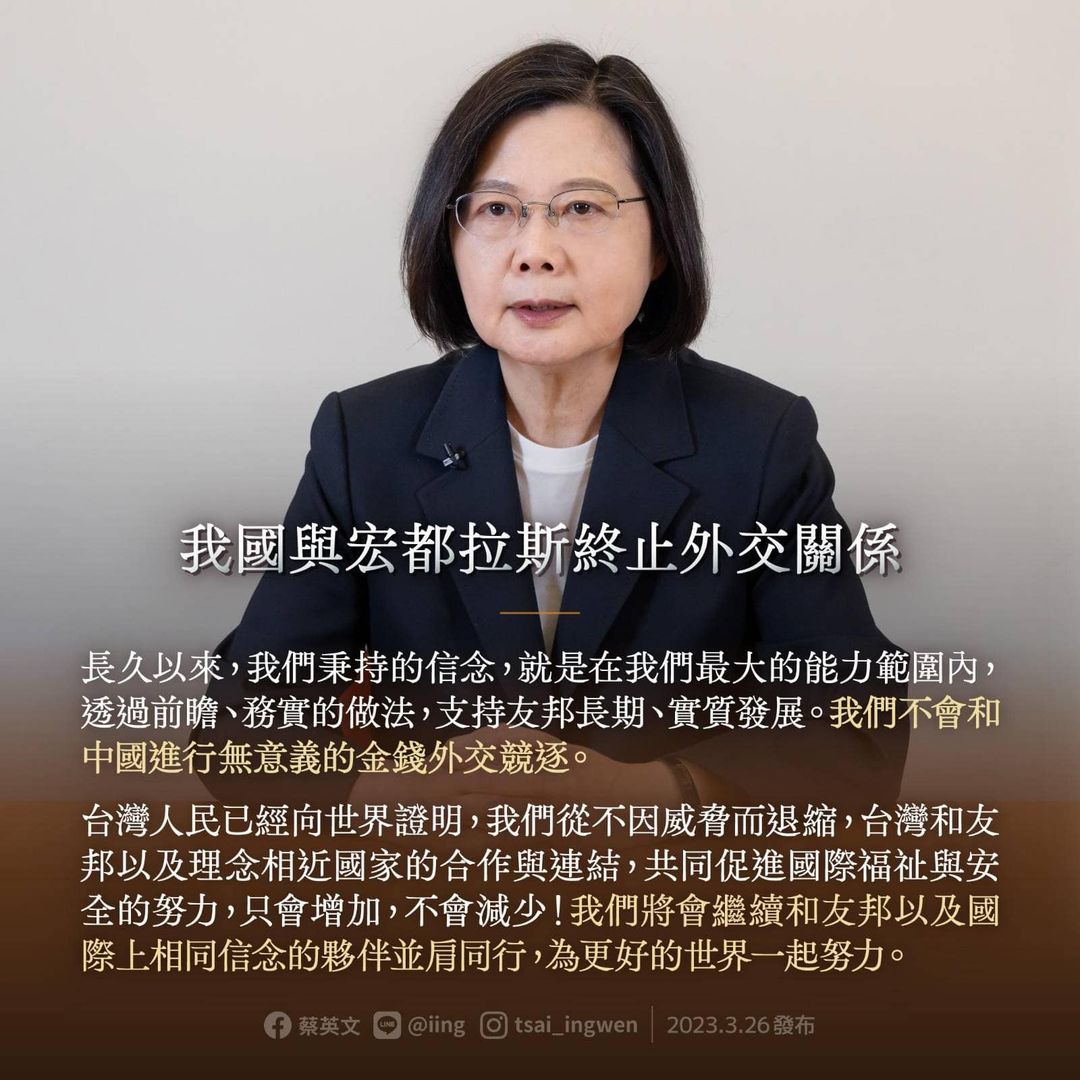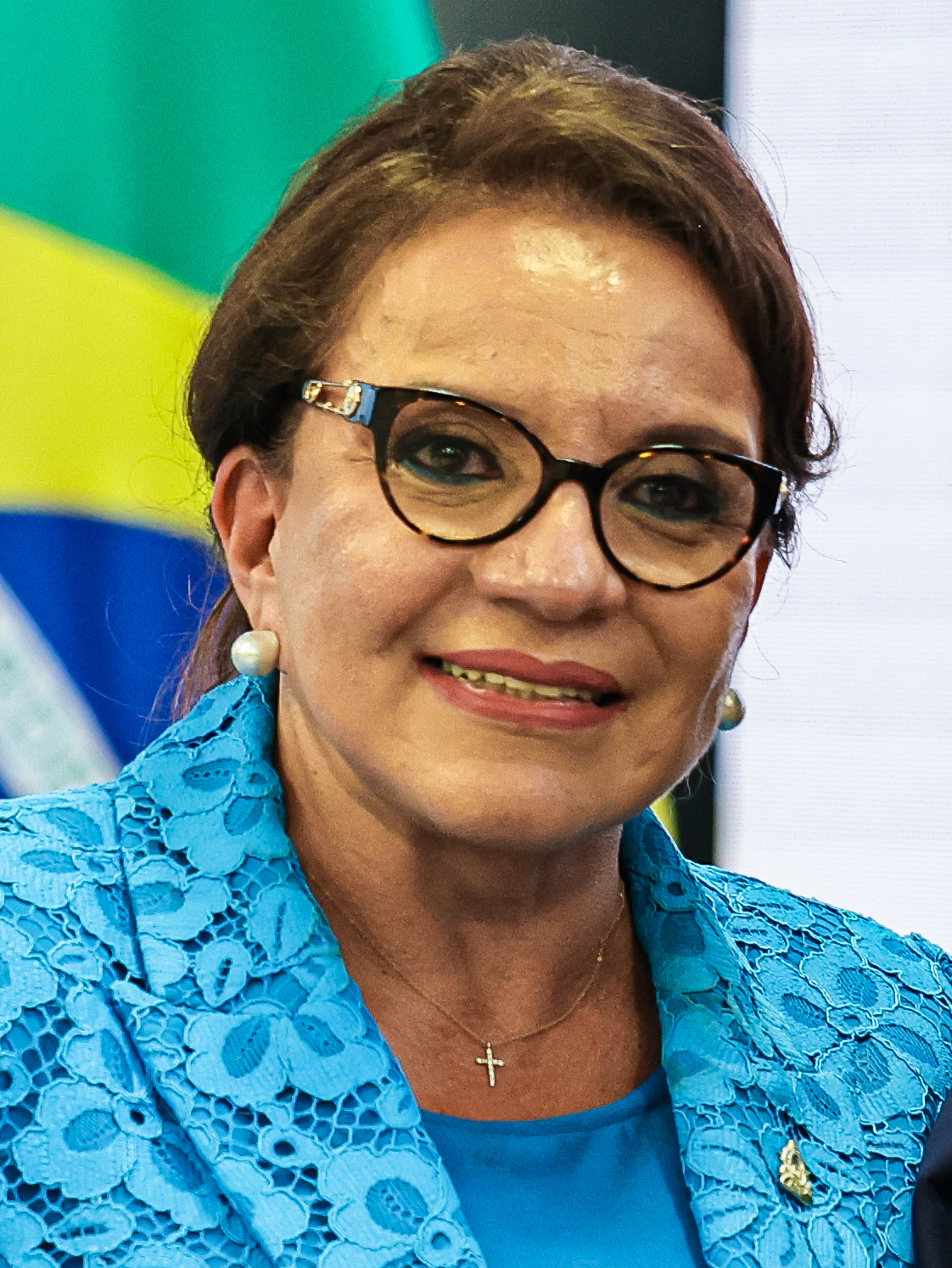by Brian Hioe
語言:
English
Photo Credit: Presidential Office/Flickr/CC BY 2.0
HONDURAS AND TAIWAN officially broke ties today after several weeks of speculation. This began after Honduran president Xiomara Castro announced on March 14th her government’s intention to break ties with Taiwan and establish ties with China, stating that she had instructed Honduras’ foreign minister to begin this process.
Subsequently followed several weeks in which it was unclear whether Honduras would genuinely follow up on this promise or not. This was not the first time there was such ambiguity either. Namely, Castro had campaigned on a pledge to break ties with Taiwan, but then later backed down on this once victorious in November 2022 elections. Apart from that Castro responded to a tweet from Tsai congratulating her on her election victory, Vice President William Lai was in attendance at Castro’s inauguration in January 2023, attending on President Tsai Ing-wen’s behalf.
Castro’s husband, former president Manuel Zelaya, continued calling for establishing ties with China. Zelaya steered Honduras towards alignment with Hugo Chavez’s Venezuela during his tenure in office before his ouster in a 2009 military coup. So it is thought that Castro and Zelaya may be more sympathetic to China, in line with leftist political stances.
 Statement by Tsai Ing-wen on the breaking of ties. Photo credit: Tsai Ing-wen/Facebook
Statement by Tsai Ing-wen on the breaking of ties. Photo credit: Tsai Ing-wen/Facebook
Following Castro’s announcement, US Special Presidential Adviser for the Americas Christopher Dodd met with Castro. It was thought that the US might try to pressure Honduras away from breaking ties with Taiwan in line with the TAIPEI Act, which encouraged countries to continue to maintain diplomatic relations with Taiwan. Castro’s decision to go ahead with breaking ties with Taiwan likely also was in consideration of how to balance Honduras’ relations with both China and the US.
Tsai stated that with the breaking of ties with Honduras, Taiwan would “not engage in a meaningless contest of dollar diplomacy with China”. Some news reports, which Honduras denied, stated that Honduras had sought 2.5 billion USD in aid from Taiwan before breaking ties, including for paying back national debt, building a hospital, and building a dam.
To this extent, Minister of Foreign Affairs Joseph Wu stated that the timing of the announcement from Honduras was suspicious, seeing as this took place shortly before a trip to visit Central American allies Guatemala and Belize by Tsai. This trip to Central America will include a stopover in the US, during which Tsai is expected to speak at the Hudson Institute in New York and meet with US Speaker of the House Kevin McCarthy in his home state of California.
Before the breaking of ties was announced, news broke that Taiwan had previously given political asylum to Castro’s daughter during the 2009 coup, reaching out to the first family. This was framed as a way that Taiwan had sought to aid Castro in the past, though the Taiwanese government later recognized the government of Juan Orlando Hernandez in 2017 in spite of elections widely viewed internationally as rigged. However, domestically, former legislator Alex Tsai of the KMT framed this as a way that the Tsai administration had bungled Taiwan’s international relations in only providing aid to Castro’s daughter and not to the family as a whole–though reportedly, members of the Castro family took shelter with different embassies during the coup, so as to diversify risk.
More generally, Taiwan is larger than all of its diplomatic allies in terms of the size of its population and economy. It maintains such relations, providing financial aid in return for recognition, so that such allies can speak up for Taiwan in international organizations, in spite of the fact that such allies sometimes have questionable human rights records. Apart from the administration or Juan Orlando Hernandez, during which killings of journalists and activists took place, and during which Hernandez was later found to have ties to drug trafficking by organized crime, another one of Taiwan’s allies is Eswatini. Eswatini is one of the world’s last remaining absolute monarchies and there, similarly, there have been reports of killings of political dissidents by individuals thought to have links to the state.
 Xiomara Castro. Photo credit: Ricardo Stuckert/Palácio do Planalto/CC BY 2.0
Xiomara Castro. Photo credit: Ricardo Stuckert/Palácio do Planalto/CC BY 2.0
But the approach of “dollar diplomacy” is increasingly questioned at a time of strengthening relations between Taiwan and the US, as well as other western powers, as seen in Tsai’s pending meeting with McCarthy or visits to Taiwan by European government officials. Some countries may also be rethinking their approach to relations with China, as a recent letter from Micronesia’s president indicates.
Taiwan now has thirteen diplomatic allies, having lost nine under the Tsai administration. This is because China refrained from poaching diplomatic allies of Taiwan during the Ma administration, but resumed doing so once Tsai took power.
In the meantime, Honduran students in Taiwan are likely to be caught in the crossfire, seeing as they are set to lose their scholarships with the breaking of ties and the ceasing of aid from Taiwan to Honduras. Yesterday, Hondurans in Taiwan demonstrated to mark the close to 82 years of relations between Taiwan and Honduras, citing that this was an apolitical demonstration to mark the historic friendship between the two countries.

